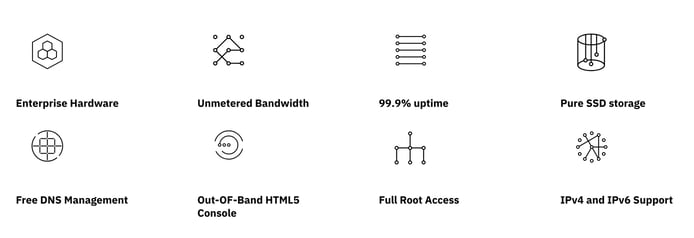
TL; DR: Entrepreneurs value high-availability servers for their ease of use and minimal downtime risk, but many hosting providers don’t offer affordable versions. Servercheap focuses on forward-thinking and robust VPS solutions without unnecessary bells and whistles. That means Servercheap can invest in its two U.S.-based datacenters and pass along cost savings to customers. The company is now building a managed services program and will soon add a third datacenter to serve even more businesses.
Gas stations all sell the same primary product at around the same price, so many have to set themselves apart with rewards, excellent service, or niche fuel specializations.
Many VPS providers operate under a similar concept. Since they offer packages that may appear identical, they must differentiate with attributes other than minor tweaks to pricing or features.
That was the market hosting provider Servercheap stepped into when it launched in 2015.

with uptime guarantees.
“At the time, most providers seemed to copy each other in terms of the product and how they price it,” said Nadya Parm, Customer Relations Leader for Servercheap. “We always found that really strange as we looked at other providers and wondered, ‘Why are they providing the same exact thing for the same exact price?’”
Nadya’s observation gets to the heart of the issue of today’s ecosystem for VPS providers: When everyone has the same offerings, they all fade into each other.
“We wanted to give more, to be more. We wanted to provide services to anybody on any budget. And that’s what we did — and still do today,” Nadya said. “We provide more resources, better uptime, and better network and customer service at a fraction of the cost others charge.”
Today, Servercheap operates two U.S.-based datacenters that deliver VPS resources for a variety of use cases. Customers enjoy full root access with optional control panels and a 99.9% guaranteed uptime SLA. Servercheap deploys only enterprise-grade hardware at its state-of-the-art facilities.
Another distinguishing factor for Servercheap is its exclusive focus on VPS technology. That approach lowers overhead, reduces costs for customers, and shows where Servercheap believes the future of hosting lies.
The VPS Market is Shifting to Cloud and High-Availability Servers
The early use cases for VPS technology related to computing power and application servers. Companies leased VPS infrastructure to offload complex processing tasks — including analysts running intensive data science projects that local hardware couldn’t handle. However, as use cases increase, the technology has been advancing in lockstep.
“Since the COVID-19 pandemic, the market is exploding, and it’s safe to say it is resilient and pandemic-proof,” Nadya said. “I believe that the future for the hosting industry, particularly cloud and VPS hosting, over the next decade will focus on the shift towards highly available services.”
High availability is another way of saying that a VPS enjoys redundancy. Should a piece of hardware fail, a high-availability server will seamlessly continue to operate because other hardware stepped in to address the fault. When a server doesn’t meet high-availability standards, a single point of hardware failure can bring the entire machine down until it is repaired, replaced, or rebooted. For many organizations, that downtime is unacceptable.

“With traditional hosting infrastructure shifting to cloud computing models, Servercheap is looking to adapt by blending our bare metal infrastructure into our cloud and offering hybrid solutions,” Nadya said. “I believe that hybrid solutions are here to stay, and bare metal cloud is a good approach to implement because cloud computing is one of the most continually disruptive forces in IT markets.”
A bare metal cloud differs from a traditional cloud in that the customer enjoys complete control over the software on the server, its operating system, and the hypervisor.
Whereas most VPS solutions are sold under a platform-as-a-service or software-as-a-service model, bare metal clouds are typically infrastructure-as-a-service. The customer rents the hardware and networking infrastructure from the provider, but everything else is under the customer’s control. Significantly, a bare-metal product dedicates one physical server to one client; multitenancy isn’t possible in this model.
Pricing and Services are Increasingly Unbundled in the Hosting Market
Bare metal clouds are part of the broader trend toward unbundling in the hosting market. The early days of shared hosting when providers delivered a comprehensive suite of products has been gradually supplanted by more specialized services. Many of those include enterprise-grade security and reliability, but at prices a small startup can afford.
“That is why we have been innovating our cloud to provide customers with turnkey hosting solutions to keep up with user expectations,” Nadya said. “VPS hosting and cloud computing will continue to evolve, and technology on the cusp of mainstream adoption — from driverless cars to ubiquitous robotics to augmented and virtual reality — will all depend on the cloud.”
That dependence means entrepreneurs will need to string together the best products and services to support their own customers instead of relying on good enough options from a vertically integrated vendor. It’s critical for hosting providers to unbundle their services and deliver what the customer needs.

In Servercheap’s view, higher-cost all-in bundles with artificial limitations don’t make as much sense given the market’s trajectory.
Servercheap offers a range of standard VPS options and bare metal servers to provide a more attractive return on investment for clients. The company does not charge for bandwidth, which many competitors do.
Any bandwidth-constrained hosting contract that may experience non-trivial bandwidth usage — as with file servers — can lead to unexpectedly high bills. In addition, the company’s one-click apps help customers deploy a tested, reliable application quickly, without installing additional tools, including WordPress, GitLab, or cPanel.
“The one thing that Servercheap does exceptionally well is help people save money,” Nadya said. “If there was ever a chart that shows money saved versus uptime, we would be through the roof.”
Servercheap: High-Quality Products at Affordable Prices
Modern entrepreneurs seek a cloud-first or cloud-supported IT model. That includes high-availability servers to provide peace of mind against the risk of extended downtime.
As more providers unbundle services, it’s critical to deliver the components businesses need without inflating cost. Servercheap provides the core services, including unlimited bandwidth, and at resource and price points that ensure every use case has a valid option.
The company has an active road map for the short term.
“We plan to open a third datacenter location sometime in 2021, but for now, the location will remain a surprise,” Nadya said. “In addition, we are also revamping our affiliate program with even more incentives, resources, and promotional tools to empower our affiliates. We’ve also seen a growing need for managed services, so we are currently working on implementing this product as well.”
Servercheap is optimal for North America-based companies that need the flexibility to manage their own servers and confidence that the server hardware meets highly available standards. The company focuses on essential needs without supporting legacy products, keeping its overhead low, and transferring those savings to customers.
“This is why many small, medium, and now large hosting companies switch to Servercheap,” she said. “We provide them with rock-solid performance while they save hundreds and sometimes thousands on their bill.”
HostingAdvice.com is a free online resource that offers valuable content and comparison services to users. To keep this resource 100% free, we receive compensation from many of the offers listed on the site. Along with key review factors, this compensation may impact how and where products appear across the site (including, for example, the order in which they appear). HostingAdvice.com does not include the entire universe of available offers. Editorial opinions expressed on the site are strictly our own and are not provided, endorsed, or approved by advertisers.
Our site is committed to publishing independent, accurate content guided by strict editorial guidelines. Before articles and reviews are published on our site, they undergo a thorough review process performed by a team of independent editors and subject-matter experts to ensure the content’s accuracy, timeliness, and impartiality. Our editorial team is separate and independent of our site’s advertisers, and the opinions they express on our site are their own. To read more about our team members and their editorial backgrounds, please visit our site’s About page.

